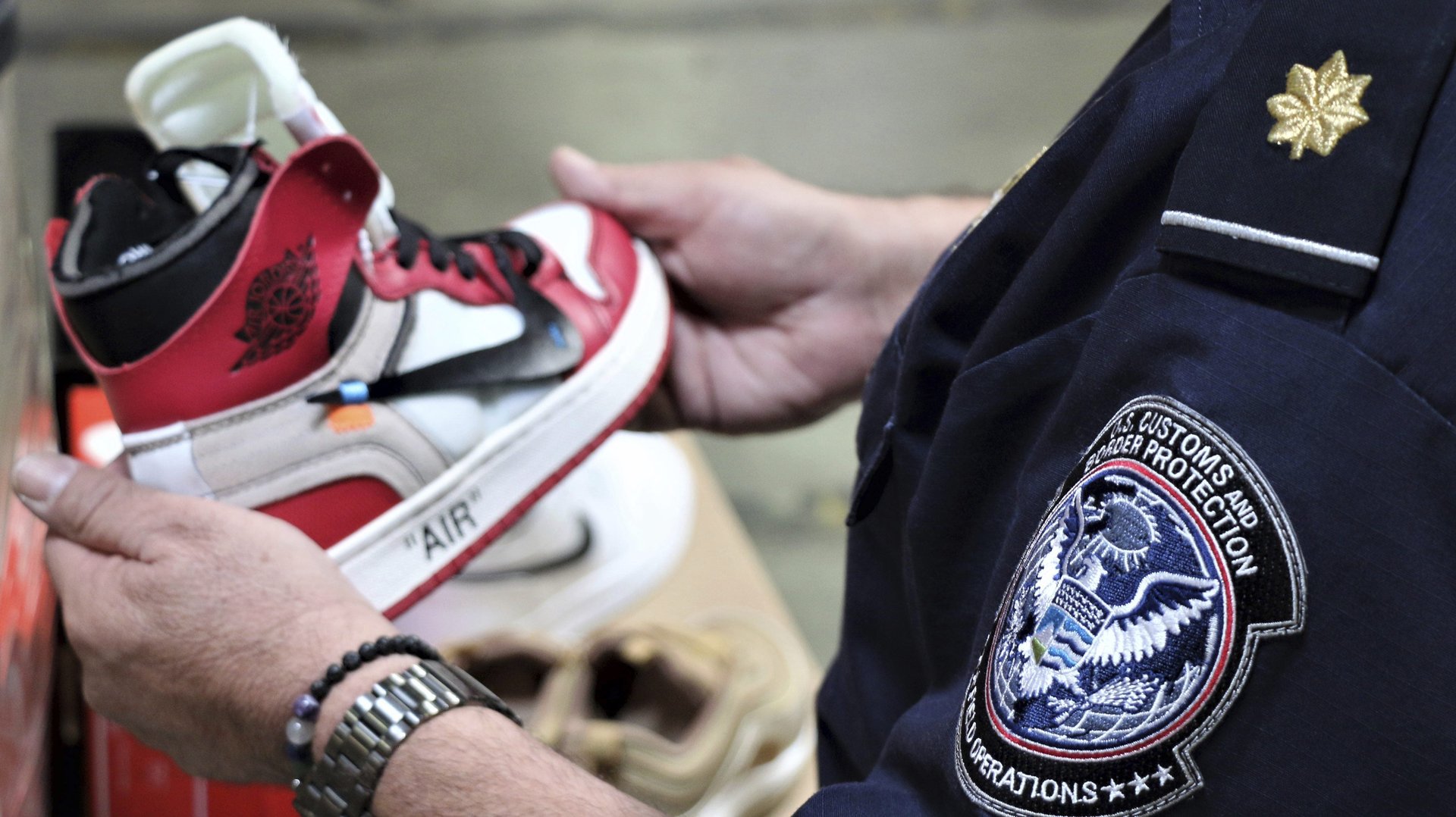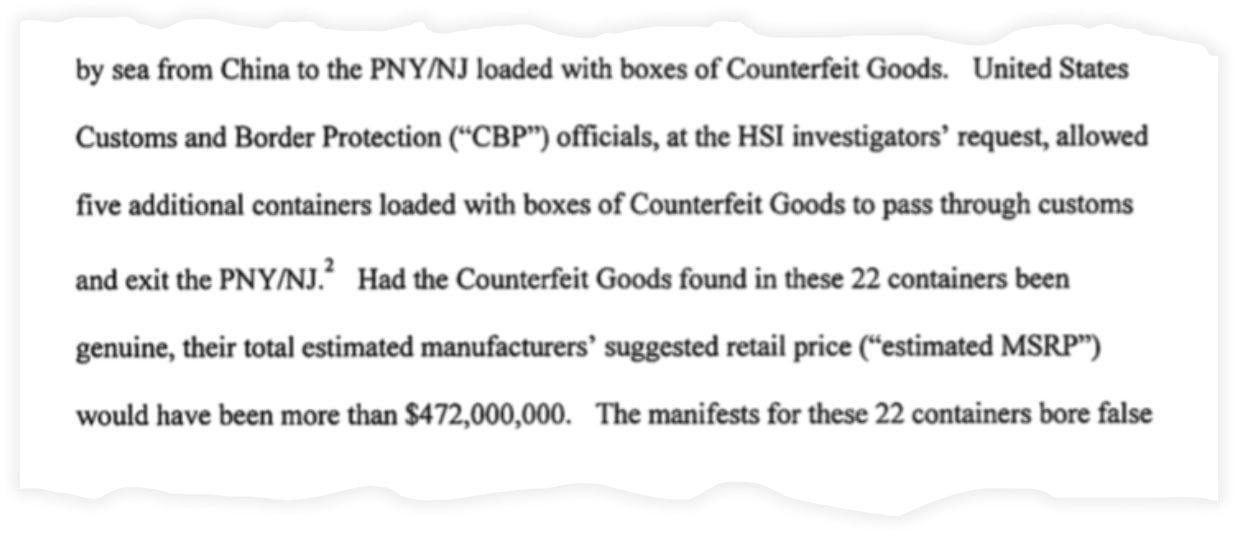How $470 million worth of fake Nikes get into the US
An international counterfeiting ring shipped hundreds of millions of dollars worth of counterfeit sneakers to the United States using an elaborate web of fictitious company names, bogus paperwork, phony email addresses, and burner phones. That’s according to a now-unsealed federal complaint, which says the fake Nike and Louis Vuitton footwear would be worth more than $472 million if it were real.


An international counterfeiting ring shipped hundreds of millions of dollars worth of counterfeit sneakers to the United States using an elaborate web of fictitious company names, bogus paperwork, phony email addresses, and burner phones. That’s according to a now-unsealed federal complaint, which says the fake Nike and Louis Vuitton footwear would be worth more than $472 million if it were real.
It was a larger-than-usual bust for US authorities, who have broken up several large sneaker counterfeiting operations in recent months. Last year, the feds busted a New York-based counterfeiting ring they say smuggled 385,280 pairs of imitation Air Jordans into the country, potentially costing Nike more than $70 million in lost revenue. In October, federal agents arrested a Queens man they say shipped more than $5 million worth of fake Timberland and Ugg boots from China into the New York City area. The same month, US Customs and Border Protection (CBP) officers intercepted 14,806 pairs of counterfeit Nike Air Jordans, which would have been worth $2.2 million, had they been genuine.
Worldwide sales of knockoff goods exceeded $520 billion last year, representing 3.3% of all global trade.
“People often make the mistake of believing that purchasing counterfeit items are a victimless crime,” one CBP official said after a recent bust. “However, these items often fund national and transnational criminal organizations, and cost taxpayers billions.”
In this latest case, the counterfeiting crew allegedly used slightly altered versions of actual company names to make their shipping paperwork look legit. Once the cargo cleared US customs, the 40-foot containers didn’t go to the addresses listed on the manifests—which falsely claimed the shipments were made up of everyday household items like ventilation fans—but rather to various self-storage facilities in Brooklyn, Queens, and Long Island, NY, where the boxes of phony sneakers were broken down into smaller quantities to be sold. Investigators eventually linked a total of 129 shipping containers containing bogus shoes to the same organization.

The network first appeared on law enforcement’s radar in February 2012, when CBP officers in the New York area seized a container loaded with counterfeit sneakers coming in from China. CBP made 16 identical seizures over the next several years—with, of course, unknown numbers slipping into the country undetected.
Finally, in October 2018, investigators picked up a crucial lead.
That’s when an unidentified defendant who pleaded guilty to federal counterfeiting charges began providing information to agents from Homeland Security Investigations (HSI), in hopes of getting a more lenient sentence. This person, who is named in court filings only as “CD,” for “cooperating defendant,” gave HSI a phone number for someone they called Ray. Investigators checked the number against a government database and found it matched one submitted on a 2017 US tourist visa application submitted by a Chinese national named Qingfu Zeng.
On the application, Zeng provided an address in Shenzhen, Guangdong, China and claimed he was the deputy general manager of an investment firm called Shenzhen Andreusen Investment Co. Ltd. Quartz could not find a company by that name listed in public records.
Setting the trap
At the direction of HSI agents, CD went undercover. Earlier this year, CD met with someone identified in court records only as “Individual-1,” at Individual-1’s store in Flushing, NY. CD gave Individual-1 the number to a burner phone and instructed them to pass it to a contact—Individual-2—in China.
Individual-2 allegedly advised CD on Zeng’s whereabouts, placing him in Argentina. Zeng later called CD with instructions to get a burner phone with a California area code.
The next day, Zeng provided the CD with an email address and password for a company called “tehtungcorp.com.” The domain was similar to a real one, “tehtung.com,” which belongs to Teh Tung Corp., a legitimate paper goods company with operations in China and the US. In fact, agents discovered, “tehtungcorp.com” had been registered the previous month in Beijing.
Zeng told CD that a 40-foot shipping container coming from Nanshan, China, would soon be arriving at the Port of Los Angeles. According to the manifest, the container was filled with 11,019 kilos of paper napkins.
But the feds had been monitoring CD’s communications with Zeng, and intercepted the container when it got to California. Inside, they found two rows of decoy boxes containing generic shoes, apparently intended to survive a busy customs inspector’s cursory glance. The rest of the container was filled with counterfeit Nikes, which a Nike rep confirmed were fakes. HSI agents seized a “small sample” of the shoes as evidence, according to the complaint, and told CBP to send the container on its way so they could track its true destination.
In April, the complaint alleges, Zeng texted CD with a new email address for CD to use: “[email protected].” Ray himself used an email at the same domain, under the name “Timothy.” CYS Excel Inc. is an actual California-based decorative glass supplier, whose real domain ends in “cysexcel.com,” not “cysexcelinc.com.” Agents performed an open-source records check, which revealed the lookalike “cysexcelinc” domain had been set up in Beijing just a few days earlier.
The complaint goes on to say that Zeng told CD that a 40-foot shipping container was set to arrive at the Port of Newark, New Jersey on June 1. The shipping manifest said the cargo—listed as 1,134 cartons of glass vases, weighing 8,970 kilos—was sent by a Hong Kong-based company called “Talent Succeed Ltd.” The contact number on the paperwork traced back to one of Zeng’s burner phones, not CYS Excel’s Baldwin Park, CA headquarters.
When the shipment arrived, agents once again found two rows of generic shoes at the front of the container, the rest filled with fake Nike sneakers. As they did previously, agents seized some of the shoes as evidence and sent the container on its intended destination, a warehouse in Brooklyn.
At the end of July, Zeng sent another 40-foot container from Hong Kong to Newark, also purportedly from Talent Succeed Ltd., and listed his fake CYS Excel email address on the customs paperwork. This time, the shipping manifest claimed the container was loaded with 1,114 boxes of glass vases, weighing 8,794 kilos. When agents opened the container, they discovered it filled with bogus Nikes, as well as fake Louis Vuitton sneakers. After removing a few pieces of the evidence, the agents released the container, which was destined for a warehouse in Long Island City, Queens.
According to details included in court filings, Zeng flew from Seoul, Korea to Las Vegas, Nevada on Dec. 4. US prosecutors filed their criminal complaint under seal on Dec. 6, keeping it secret so Zeng would not find out and flee the country. On Dec. 27, federal agents arrested Zeng as he stepped off a flight at Dulles Airport, just outside Washington, DC.
The case was first filed in Virginia, where Zeng was apprehended, but it is now being transferred to the Eastern District of New York, Geremy Kamens, the court-appointed lawyer who represented Zeng at his initial hearing, told Quartz.
“Other than that, I don’t have any info,” Kamens said.
The Department of Homeland Security did not immediately respond to a request for comment.